These buildings in Topeka don't lack in historical significance or beauty
- Oops!Something went wrong.Please try again later.
Topeka is full of historical treasures dating back to the founding of the state, but many of the city’s most iconic buildings have faced uncertain futures.
Advanced decay and disrepair, a lack of funding and the absence of interested buyers are roadblocks to preservation efforts.
Private citizens purchased and funded the rehabilitation of properties with significant historical ties to Kansas, including the Charles Curtis House, the Thacher Building and the Jayhawk Theatre.
Katrina Ringler, deputy state historic preservation officer at the Kansas Historical Society, said while Kansas is invested in supporting historic preservation efforts, there are several reasons the state can't buy the properties outright.
“Purchase or acceptance of a donation of any property requires approval by the state Legislature,” said Ringler. “The long-term cost of maintaining historic structures, along with other necessary funding and staffing is taken into careful consideration by legislators. We administer several financial incentive programs that can help offset the cost of preserving and adaptively reusing historic properties.”
The Charles Curtis House is currently on the market in Topeka
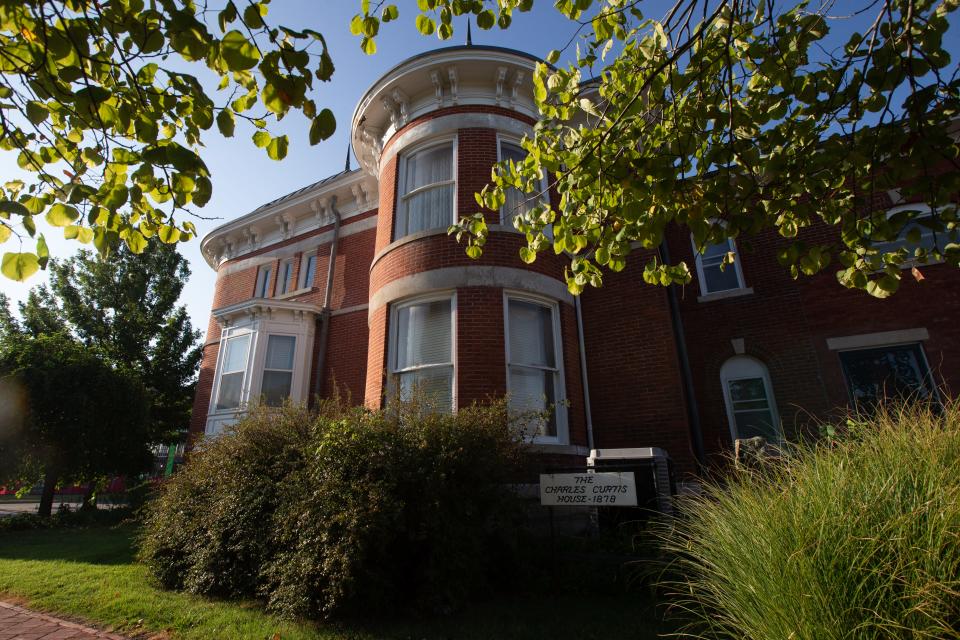
The Charles Curtis House, 1101 S.W. Topeka Blvd., is a privately owned brick mansion just southwest of the Kansas Statehouse. It was built in 1878, and Charles Curtis, the first vice president from Kansas, lived there from 1907 until 1937, including during the years he served in President Herbert Hoover's administration.
Curtis holds the titles of first Native American vice president and first vice president born west of the Mississippi River as well. The house is on the National and State Registers of Historic Places and on the Topeka Landmarks Register.
In 1993, the Charles Curtis House was in danger of being demolished. It required extensive renovations and was on the endangered properties list.
Don and Nova Cottrell purchased the house and spent the next 25 years restoring it. They opened it as a museum in Curtis’ honor, filling it with antiques and memorabilia from the period and inviting the public to learn more about the famous Kansan.
“My parents loved this house and loved all the people they met through it,” said Patty Dannenberg, the Cottrells’ daughter.
Dannenberg, along with her siblings, inherited the Charles Curtis House from her parents in 2020. She said that before her death, her mother wrote several grants and received money to repair the home’s lead-coated copper roof, a major expense for a house of its age.
“They didn’t go into debt over it,” said Dannenberg. “Every year, they would do a room or a certain project.”
A separate grant from the city covered the installation of modern heating and cooling systems, and the Cottrells funded updates to the plumbing, foundation and brickwork out of their own pockets, doing much of the work themselves.
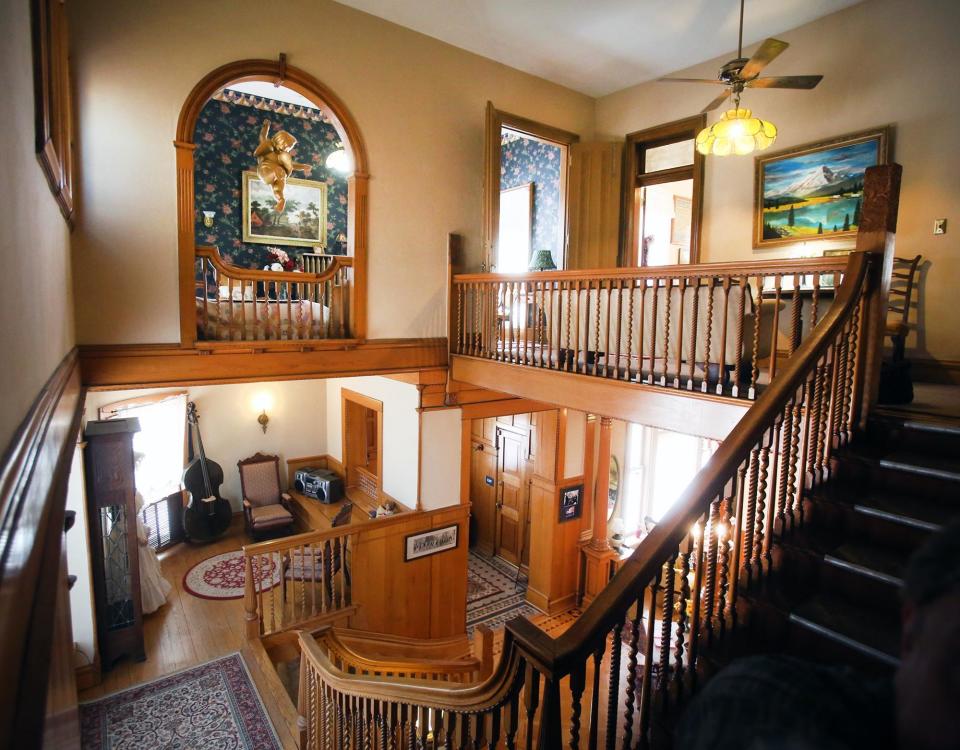
Nova Cottrell petitioned the state for years to purchase the preserved Charles Curtis House for use as a state historic site and museum. Dannenberg said there was a brief discussion during the Brownback administration about purchasing the house for the purpose of providing the women of the Republican Party a place to host events.
The family also approached the Shawnee County Historical Society and Kansas State Historical Society about purchasing the Charles Curtis House, but neither had the funds to buy the house outright.
“State and federal agencies cannot always take on the commitment of owning all the historic properties that deserve preservation,” said Ringler, “but we can encourage and assist private investors through programs like tax credits and grants. Those programs help spread the government’s resources and ultimately help more properties.”
The Charles Curtis House is on the market and comes fully furnished with a listing price of $650,000. Dannenberg said she’s waiting on the right buyer to sell.
“I don’t want it to be used for anything other than a museum,” said Dannenberg. “There’s a group who is interested in it for the purpose of historic preservation and continuing it as the Charles Curtis House. They are currently working on funding.”
Funding preservation projects through grants and historic tax credits
The state and federal governments offer incentives to private owners of historic properties listed on the National Register of Historic Places.
A federal tax credit program allows credit equal to 20% of the total qualified expenses for listed historic properties. The Heritage Trust Fund is a state program that provides matching funds for the preservation of properties on either the National Register or on the Register of Historic Kansas Places.
“Careful preservation, protection, and long-term stewardship of historic places can be a big investment,” Ringler said. “Repairing historic materials and preserving the characteristics of a historic place often takes more skilled labor than building new or simply replacing them, and that labor can be costly.”
Jeff Carson, who owns the Thacher Building and is president of the Jayhawk State Theatre of Kansas board of directors, said Kansas is a head above other states when it comes to supporting historic preservation projects.
“Kansas has one of the most robust historic tax credit programs,” said Carson. “The state does a really great job. The ability to restore these buildings and create state of the art entertainment facilities is invaluable to Topeka.”
The Thacher Building was built in 1888
Carson and business partner Greg Ready own the Thacher Building,112 S.E. 8th Ave. Constructed in 1888 for $40,000, the architect was John Gideon Haskell, who also designed the Kansas Statehouse. The building’s namesake, Timothy Dwight Thacher, was a local businessman who settled in Topeka and helped establish the Kansas Republican Party.
“This building has a long history. The Republican Party was formed in that building,” said Carson.
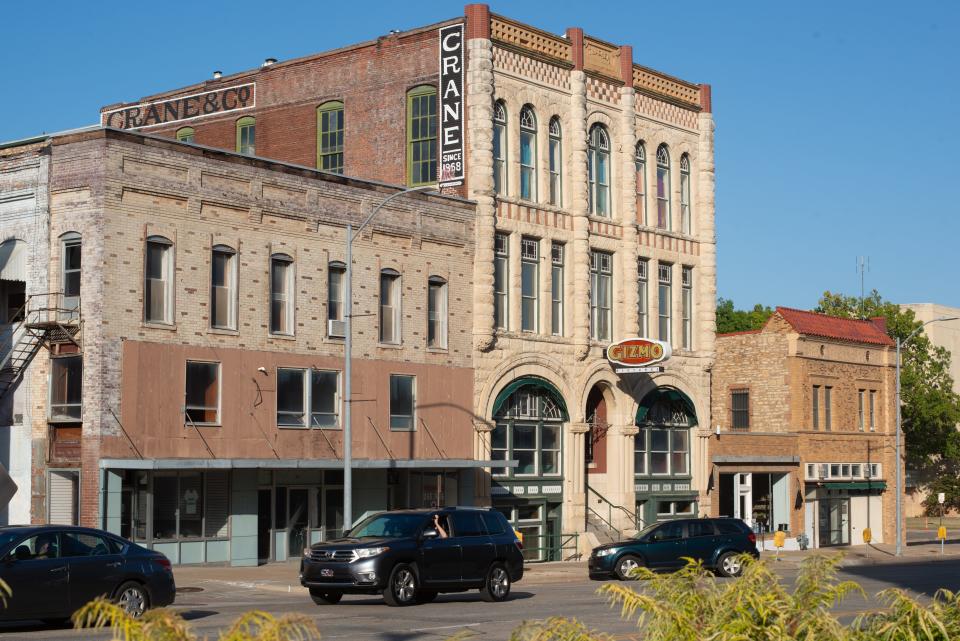
The Thacher Building was placed on the National Register of Historic Places in 1975. It’s one of the last commercial buildings from that era still standing today.
Carson and Ready purchased the property to house their business, Gizmo Pictures. They invested in renovating the space inside to accommodate Gizmo and two additional businesses: Juli’s Coffee Bar & Bistro and Prairie Glass Studio.
“We’re caretakers of these old buildings," Carson said. "We don’t always know the challenges that lie ahead to save them, preserve them, and hand them on to the next caretaker. When we bought the building in 2009, one of the masonry walls was repaired before we owned it.”
Carson said that repair eventually began to fail, causing debris to crack off of the brick work on the second floor of the structure. An engineer they brought in to address the issue expressed concern. Carson and Ready responded by installing a temporary bracing system inside so the building could be safely used pending repair.
The estimated cost to permanently fix the damage at that time was $400,000, which Carson said was more than they originally paid to purchase the building. When the pandemic hit, all three businesses relocated to different spaces.
Even after applying for historic tax credits and receiving $90,000 from an HTF grant in 2021, Carson said they came up more than $200,000 short in funding needed to repair the Thacher Building. They have attempted to secure financing for the remainder of the cost, but banks are unwilling to lend such a large sum to repair it.
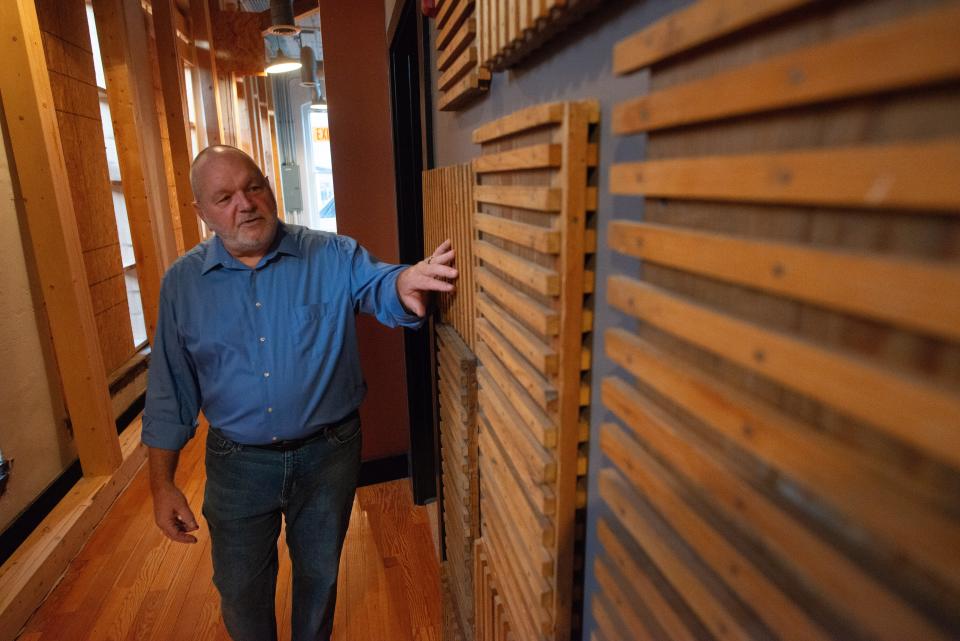
“The downtown historic district doesn’t have the mechanism in place for emergencies,” said Carson. “Financing major repairs like this is really, really difficult. It’s unfortunate that there isn’t a method to fix some of these treasures, but downtown leadership is aware of the challenges I’m facing.”
Since the existing structural issue hasn't destabilized any further since it was addressed, Carson said he is marketing the Thacher Building to parties who might have an interest in opening a restaurant or bar. A long-term lease could serve as collateral for a bank loan to move forward with the repairs.
Carson has continued to make improvements on the top floor to increase the building’s marketability for this purpose.
“I’m having conversations with people who love the Thacher and want to help breathe new life into this beautiful gem,” said Carson.
The Historic Jayhawk Theatre
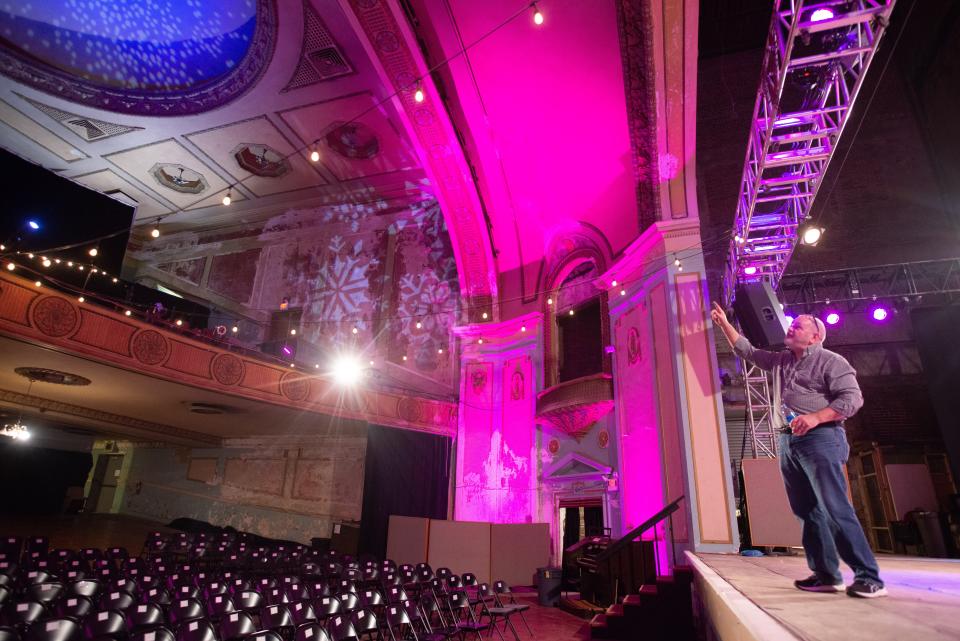
Following decades of fundraising efforts, renovations to the Historic Jayhawk Theatre, 720 S.W. Jackson St., will begin in March 2024. Carson said construction is expected to last about 18 months and run between $16 million and $20 million, a figure that has doubled in recent years.
The Jayhawk Theatre opened in 1926, at an estimated cost of $750,000 to $1 million to construct. It was a grand 1,500-seat theater and hosted movies, live performances and other events. At three levels tall, two grand staircases connected the lobby and concession area to the mezzanine floor, which contained a projection booth, lounge, coat room and office space.
The auditorium was completely open, as it was built without support columns that would have obstructed the audience’s view. An arched stage featured the hand-painted work of Chicago artist William Peaco, whose murals can be found in many historic buildings throughout the Midwest.
Before the theater closed in 1974, it was listed on the National Register of Historic Places and is the only remaining historical theater in Topeka. In 1993, the Kansas Legislature named the Jayhawk Theatre the State Theatre of Kansas.
Since the mid-1990s, a board of directors has acted as caretaker of the property, which was gifted to them by private donors. The board is responsible for raising funds for the theater’s upkeep and restoration. Ongoing efforts have been in hopes of restoring the historic theater to its original glory.
“We’ve been working very hard to cultivate a fan base to come to the theater, to attract corporate contributors and to secure grants,” said Carson. “We’ve put together a team with skill sets to do big fundraising projects and construction projects before it reopens.”
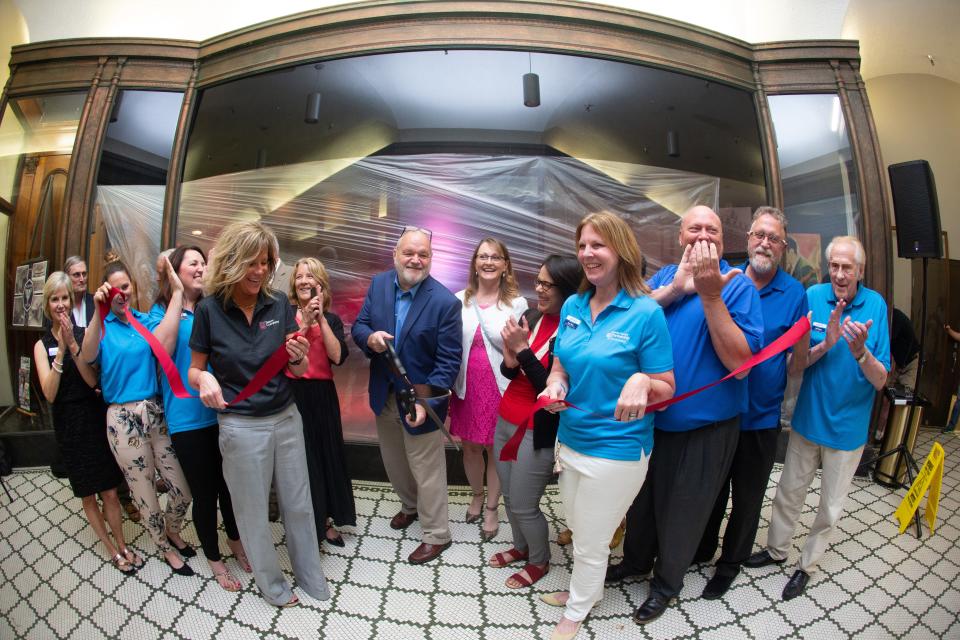
The Jayhawk Theatre is the recipient of several financial incentive programs from the Kansas Historical Society, including an HTF grant for $54,240 in 2012 and another for $90,000 in 2021 to assist with foundation repairs.
“The Jayhawk Theatre has applied for state and federal historic tax credits also administered by our office,” said Ringler.
Following a rigorous application process, the board recently learned that the Jayhawk Theatre was selected to receive $5 million in State Park Revitalization and Investment in Notable Tourism grants. SPRINT dollars from the Kansas Department of Commerce seek to support tourism in the state by funding improvements to tourism-focused businesses.
“These are federal dollars, so actual Kansas federal taxpayer money accounts for a very small fraction of that,” said Carson. “The board has visited several cities with vibrant downtown areas, and they all have one thing in common — a historic theater that those communities are very proud of.
"When we have a thriving restaurant and thriving theater, it will be an exciting time, and now’s the time.”
Carson said the SPRINT funding came at the right time for the Jayhawk Theatre. Recent improvements to the downtown area have created an environment where people want to be.
“If this money had been available sooner, there were fewer options downtown to attract people to the area eight to 10 years ago," Carson said. "There has been a ton of investment in recent years, and the stage has been set to have a modern, attractive downtown.
"'Our work is easier now. We’ve got great support from the city, county and state.”
Editor's note: An earlier version of the story had an incorrect construction estimate for the Historic Jayhawk Theatre.
This article originally appeared on Topeka Capital-Journal: These Topeka buildings are historical treasures. One is up for sale

